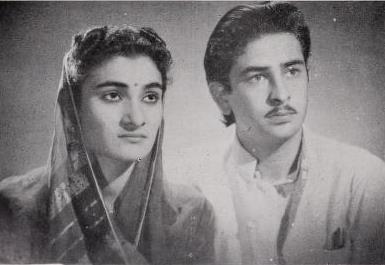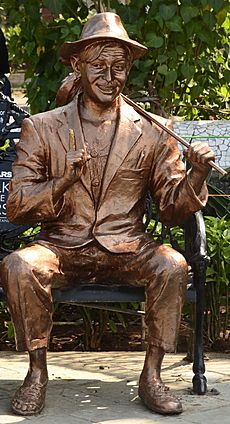Raj Kapoor facts for kids
Quick facts for kids
Raj Kapoor
|
|
|---|---|
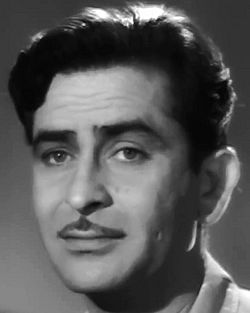
Raj Kapoor in Anari (1959)
|
|
| Born |
Shrishti Nath Kapoor
14 December 1924 |
| Died | 2 June 1988 (aged 63) |
| Other names | Ranbir Raj Kapoor, The Showman, The Greatest Show Man of Indian Cinema, Charlie Chaplin of Indian Cinema, Raj Sahab |
| Education |
|
| Occupation | |
| Years active | 1935–1988 |
|
Works
|
Full list |
| Spouse(s) |
Krishna Malhotra
(m. 1946–1988) |
| Children | 5, including Randhir, Ritu, Rishi, and Rajiv |
| Parent(s) |
|
| Relatives | See Kapoor family |
| Awards | Full list |
| Honours |
|
| Signature | |
 |
|
Raj Kapoor (born Shrishti Nath Kapoor; December 14, 1924 – June 2, 1988) was a famous Indian actor, film director, and producer. He worked in Hindi cinema, also known as Bollywood. Many people consider him one of the greatest and most important actors and filmmakers in Indian cinema history. He was often called The Greatest Showman of Indian Cinema and the Charlie Chaplin of Indian Cinema.
Born in Peshawar, Raj Kapoor was the son of the well-known actor Prithviraj Kapoor. He starred in and produced many movies that won him several awards. These included three National Film Awards and 11 Filmfare Awards in India. He was inspired by Charlie Chaplin and often played characters similar to Chaplin's "Tramp." You can see this in films like Awaara (1951) and Shree 420 (1955). His acting in Awaara was even named one of the "Top-Ten Greatest Performances of All Time in World Cinema" by Time magazine in 2005.
His movies were very popular and successful in many parts of the world, including Asia, the Middle East, Africa, and the former Soviet bloc. The Government of India honored him with the Padma Bhushan award in 1971 for his contributions to the arts. In 1987, he received India's highest film award, the Dadasaheb Phalke Award.
Contents
Early Life and Family Background
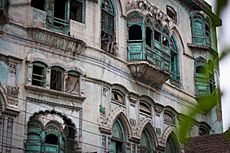
Raj Kapoor was born as Shrishti Nath Kapoor on December 14, 1924. His birthplace was Kapoor Haveli, a large family house in Peshawar, which was then part of British India. He came from a Punjabi Hindu family, the famous Kapoor family. His parents were Prithviraj Kapoor and Ramsarni Devi Kapoor.
Raj Kapoor was the oldest of six children. His younger brothers, Shammi Kapoor and Shashi Kapoor, also became famous actors. His family later moved from Peshawar to Bombay (now Mumbai) for their home and for the children's education.
Because his father, Prithviraj Kapoor, moved often for his acting career in the 1930s, Raj Kapoor went to several different schools. These included Colonel Brown Cambridge School in Dera Doon, St Xavier's Collegiate School in Calcutta, and Campion School in Bombay.
Film Career Highlights
Raj Kapoor first appeared in a Hindi film at the age of ten in 1935, in a movie called Inquilab. He got his first main role in the film Neel Kamal (1947), acting alongside Madhubala.
In 1948, when he was just 24 years old, Raj Kapoor started his own film studio, R. K. Films. This made him the youngest film director of his time. His first movie as a director was Aag, where he also starred with Nargis. In 1949, he had a big success as an actor in Andaz. Later that year, his film Barsaat was a huge hit, where he was the producer, director, and star.
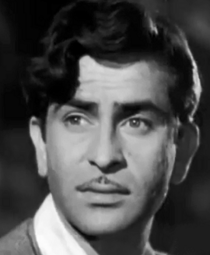
He continued to produce and star in many successful films under his R. K. Banner. These included Awaara (1951), Shree 420 (1955), and Jis Desh Men Ganga Behti Hai (1960). These movies helped create his famous screen image, which was like Charlie Chaplin's "Tramp" character. He also acted in other popular films like Anari (1959).
In 1964, he produced, directed, and starred in Sangam, which was his first color film. This was one of his last big successes as a lead actor.
In 1970, he made his ambitious film Mera Naam Joker, which took over six years to finish. His son Rishi Kapoor made his acting debut in this movie, playing a younger version of Raj Kapoor's character. When it first came out, Mera Naam Joker did not do well at the box office. However, over time, it became known as a classic film.
Raj Kapoor helped launch the careers of his sons. In 1971, he introduced his eldest son Randhir Kapoor in Kal Aaj Aur Kal. In 1973, he launched his second son Rishi Kapoor with the film Bobby. Bobby was a huge success and also introduced actress Dimple Kapadia. This film started a new trend of teen romance movies.
In the late 1970s and early 1980s, he directed films that focused on strong female characters. These included Satyam Shivam Sundaram (1978) with Zeenat Aman, Prem Rog (1982) with Padmini Kolhapure, and Ram Teri Ganga Maili (1985) which introduced Mandakini. He acted in fewer films during this time but had notable roles in movies like Naukri (1978) and Abdullah (1980). His last major film appearance was in Vakil Babu (1982).
Before he passed away in 1988, Raj Kapoor was planning to direct a film called Henna. His son Randhir later completed and released the film in 1991.
Personal Life and Family
On May 12, 1946, Raj Kapoor married Krishna Malhotra. Their marriage was arranged by their families, which was a common tradition in India. They remained married throughout their lives.
Raj and Krishna Kapoor had five children: three sons and two daughters. Their sons, Randhir Kapoor (born 1947), Rishi Kapoor (1952–2020), and Rajiv Kapoor (1962–2021), all became actors. Their daughters are Ritu Nanda (1949–2020) and Rima Jain (born 1955).
Many members of the Kapoor family have become involved in the film industry. Randhir Kapoor is married to former actress Babita and is the father of actresses Karishma Kapoor and Kareena Kapoor. Rishi Kapoor was married to former actress Neetu Singh and is the father of actor Ranbir Kapoor. These grandchildren are some of the latest Bollywood stars from the Kapoor family.
Sadly, Raj Kapoor's eldest daughter Ritu passed away in January 2020. His second son Rishi died in April of the same year, and his youngest son Rajiv died in February 2021.
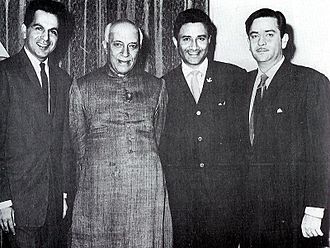
Raj Kapoor had many close friends in the movie industry, including famous names like Dilip Kumar, Mukesh, Dev Anand, and Rajesh Khanna.
Directed Films
Raj Kapoor directed ten feature films during his career:
- Aag (1948)
- Barsaat (1949)
- Awaara (1951)
- Shree 420 (1955)
- Sangam (1964)
- Mera Naam Joker (1970)
- Bobby (1973)
- Satyam Shivam Sundaram (1978)
- Prem Rog (1982)
- Ram Teri Ganga Maili (1985)
Later Years and Legacy
In his later years, Raj Kapoor suffered from asthma. He passed away on June 2, 1988, at the age of 63, due to complications from his illness. He collapsed at an event where he was to receive the Dadasaheb Phalke Award and was hospitalized for about a month before his death.
Memorial at Pune Farm
Raj Kapoor's memorial, along with those of his parents, is located at their family farm called "Rajbaugh" (meaning "gardens of king"). This farm is near Pune in Maharashtra. The Kapoor family sold part of the farm to MIT Art Design and Technology University, which built a memorial for the family on its campus. The memorial was opened in 2014. Raj Kapoor filmed many of his movies at this farm, including Satyam Shivam Sundaram, Mera Naam Joker, Bobby, and Prem Rog.
His Lasting Impact
Raj Kapoor is often called The Greatest Showman of Indian Cinema. Film experts compare him to Charlie Chaplin because he often played a character who, despite facing difficulties, remained cheerful and honest. His movies were very popular and successful around the world.
The Government of India's Films Division made a documentary about him called Raj Kapoor in 1987. To honor him, India Post released a postage stamp with his face on it in 2001. A brass statue of him was also unveiled at the Walk of the Stars in Mumbai in 2012.
Many of Raj Kapoor's films had patriotic themes. Movies like Aag, Shree 420, and Jis Desh Men Ganga Behti Hai celebrated India's independence and encouraged people to be proud of their country. He famously commissioned the lyrics for the song "Mera Joota Hai Japani" from Shree 420:
- Mera joota hai Japani (My shoes are Japanese)
- Ye patloon Inglistani (These trousers are English)
- Sar pe lal topi Roosi (The red cap on my head is Russian)
- Phir bhi dil hai Hindustani (But still, however, my heart is Indian)
This song is still very popular today. In 2014, Google honored his 90th birthday with a special doodle.
Raj Kapoor had a great ear for music and lyrics. Many of the songs from his films are still popular hits. He helped introduce famous music directors Shankar–Jaikishan and lyricists Hasrat Jaipuri and Shailendra. He was also known for his strong visual style, using impressive sets and lighting in his films. He helped launch the careers of actresses like Nimmi, Dimple Kapadia, and Mandakini, and also helped his sons Rishi, Randhir, and Rajiv become successful actors.
Awards and Recognitions
Raj Kapoor received many awards during his career. He won 3 National Film Awards and 11 Filmfare Awards. His films Awaara (1951) and Boot Polish (1954) were nominated for the top prize, the Palme d'Or, at the Cannes Film Festival. His acting in Awaara was even called one of the "Top Ten Performances of All Time in World Cinema" by Time magazine. His film Jagte Raho (1956) won the Crystal Globe award at the Karlovy Vary International Film Festival.
The Government of India honored him with the Padma Bhushan in 1971 and the Dadasaheb Phalke Award in 1987. The Dadasaheb Phalke Award is the highest award for excellence in Indian cinema. In 2001, he was named "Best Director of the Millennium" by Stardust Awards, and in 2002, he was called "Showman of the Millennium" by Star Screen Awards.
In 2011, it was announced that Raj Kapoor would be included in the Brampton Walk of Fame in Ontario, Canada, honoring his life and work.
Collaborations with Artists
Raj Kapoor often worked with the same talented people on his films.
Khwaja Ahmad Abbas
Khwaja Ahmad Abbas was a screenwriter and director who worked on many of Raj Kapoor's best films, including:
- Awaara (1951)
- Shree 420 (1955)
- Mera Naam Joker (1970)
- Bobby (1973)
Shankar–Jaikishan
Shankar–Jaikishan were Raj Kapoor's favorite music directors. They worked together on 20 films, including 10 of his own productions, from Barsaat until Kal Aaj Aur Kal. After Jaikishan passed away, Raj Kapoor started working with other music directors like Laxmikant–Pyarelal and Ravindra Jain.
Nargis
Raj Kapoor and actress Nargis worked together in 16 films. Six of these were his own productions. Some of their famous films together include:
- Aag (1948)
- Barsaat (1949)
- Awaara (1951)
- Shree 420 (1955)
- Chori Chori (1956)
Mukesh and Manna Dey
Mukesh was almost always Raj Kapoor's singing voice in his films. When Mukesh died, Raj Kapoor famously said, "I have lost my voice." However, Manna Dey also sang many popular songs for Raj Kapoor, especially in films like Shree 420 and Chori Chori. Some of these songs include "Dil Ka Haal Sune Dil Wala" and "Aaja Sanam Madhur Chandni Mein Hum."
Images for kids
See also
 In Spanish: Raj Kapoor para niños
In Spanish: Raj Kapoor para niños
 | Laphonza Butler |
 | Daisy Bates |
 | Elizabeth Piper Ensley |


